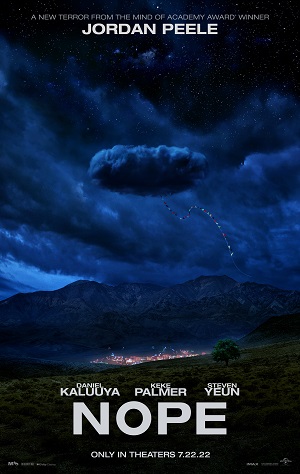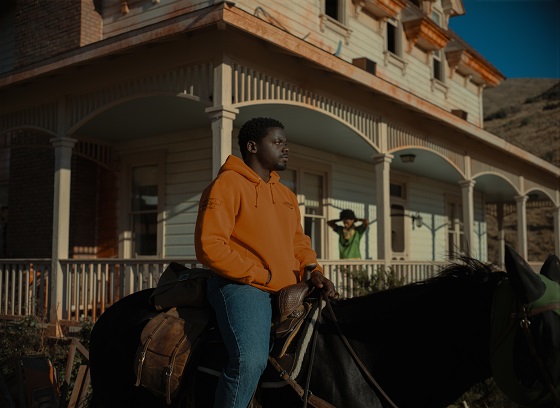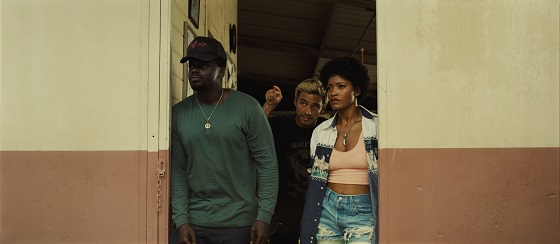

[Rating: Minor Rock Fist Up]
In Theaters Friday, July 22nd
People are going to try and sell Nope as a 70s-era Spielberg homage, or a 50s alien-invasion throwback, and while there’s notes of all these things in the picture, this is 100% undiluted, uncut Jordan Peele. A bracing, suspenseful, well-paced thrill-a-minute corker buttressed by insightful, cutting social commentary vis a vis metaphor and subtext, the movie zigs whenever one expects a zag. And while the message and intent of Nope is clear, the narrative geography underpinning it isn’t always as precise.
After a flashback cold open, the movie introduces the audience to the Haywood family, who run the only black-owned horse wrangling service in Hollywood. OJ (Daniel Kaluuya) and Em (Keke Palmer) have taken over the business following the passing of their father (Keith David), whose death from a falling nickel from the sky serves as the first warning from above. Although Em is eager to explain to anyone in earshot that her family is descended from the first individual ever recorded on film (a black jockey), her dedication to the actual day-to-day operations of the ranch is lacking. ‘Jupe’ Parker (Steven Yeun), former child actor and proprietor of the nearby western-themed amusement park, has been keeping the Haywoods afloat with the recent purchase of a few horses, but it’s just not enough.
The strain of keeping the ranch going whilst hustling to get work in L.A. (50 miles south) is driving a wedge between the siblings, so when what appears to be a flying saucer comes through their vast, desolate valley, the Haywoods do the only sensible thing: they gear up to get it on film and go viral. Assembling a squad that includes over-eager A/V specialist and UFO enthusiast, Angel (Brandon Perea), and grizzled industry cinematographer, Antlers Holst (Michael Wincott), they chase after the fabled “Oprah” shot that will make them famous.

A master craftsman of suspense with an encyclopedic understanding of genre, Peele never struggles to keep his audience’s attention throughout a surprisingly brisk 130 minutes. His use of space in what might initially appear to be a barren, desert canvas is superb, creating not just a sense of place between the actors and landmarks, but a gripping cat-and-mouse labyrinth for the action. Flirting with the visually obscure, cinematographer Hoyte Van Hoytema ably walks a tightrope on the edge of comprehension, forcing a few squints but never any furrowed brows. Peele knows that to build suspense yet still hold his audience’s attention he’s got to be careful with how much to reveal and when, and for the first two-thirds of this one, he succeeds.
Yet as Nope moves into its final act, and the curtain is pulled back (sort of) on the central mystery, the seams holding everything together begin to stretch and tear. The nature of (and the rules governing) the threat aren’t established until the end of the second act, giving the action and suspense of the first hour-plus a surplus of thrust with little direction. The role Jupe and his park play in the development of the threat are also left murky and pose just as many new questions as answers. And while Peele manages to put a bow on everything by the end, it comes across as somewhat cobbled together, and frustratingly feels one edit or script revision away from matching the brilliance of the story’s general intent and subtext.
Because what this film is about in the grander, broadest sense is crystal-clear. Em’s Haywood history monologue is a stand-in not just for people of color in the entertainment industry, but anyone who dares to venture into the deep end of Hollywood. Like the jockey in that first motion picture, 99.9% of the people involved are lost to the sands of time: the only residue of their existence hidden in vanishing credits scrolling at high-speed once most have already tuned out or left. In some cases, this results in simple erasure, but in others, the failure to know or understand how the entities around you operate can be deadly.

Peele explores this on several levels, starting with his horrifying cold open, and later with the treatment of OJ and his horse during a commercial shoot. Jupe’s rodeo show and the consequences of that are a natural extension of this idea, joining the nominal heroes of the picture as they all take turns falling into the moral trap Peele is cautioning against. Whether it is a television executive taking advantage of horses and chimpanzees, Jupe tempting forces he doesn’t understand, or Haywood and co. risking it all for their perfect “Oprah” shot, everything seems to be cautioning against abandoning memory and messing with forces one does not fully understand.
It’s the narrative mechanics that fail, here, as Peele and Nope find more purchase with the broader ideas of the story than the story itself. And while none of this sinks the movie or pulls a viewer out of the action, it does make a person wonder what might have been with just a few more dots connected. Palmer is a standout amongst a rock-solid cast, all of whom do outstanding work (though Wincott can’t help but to steal every single frame he occupies). Kaluuya plays OJ with a simmering intensity that keeps most of his best work obscured, much like the elusive entity in the skies above him, yet his contributions are no less impressive than Palmer’s: both of whom carry the weight of the picture’s notions of legacy to the finish line.
More “good” than “great,” Nope has no shortage of fascinating ideas and gripping action set-pieces, even if the connective tissue binding all of the script’s particulars don’t always bridge the gaps. A stacked cast and Peele’s confident hand behind the camera keep this one interesting and engaging throughout, yet also tickle the “what-if” portions of a person’s brain when realizing just how close this one is to a masterpiece.





Comments on this entry are closed.